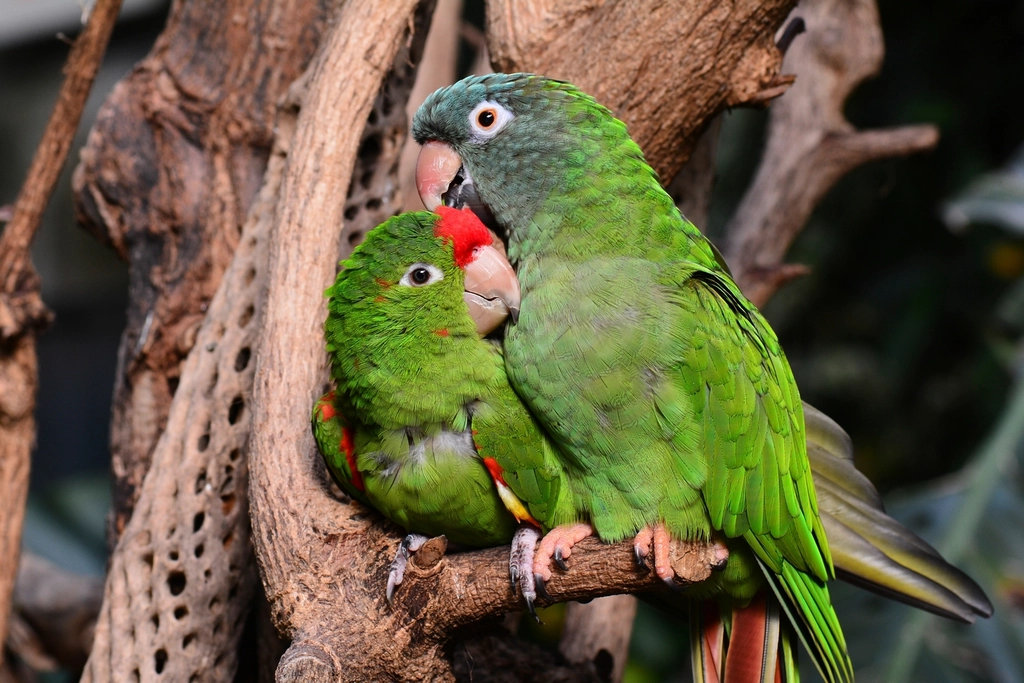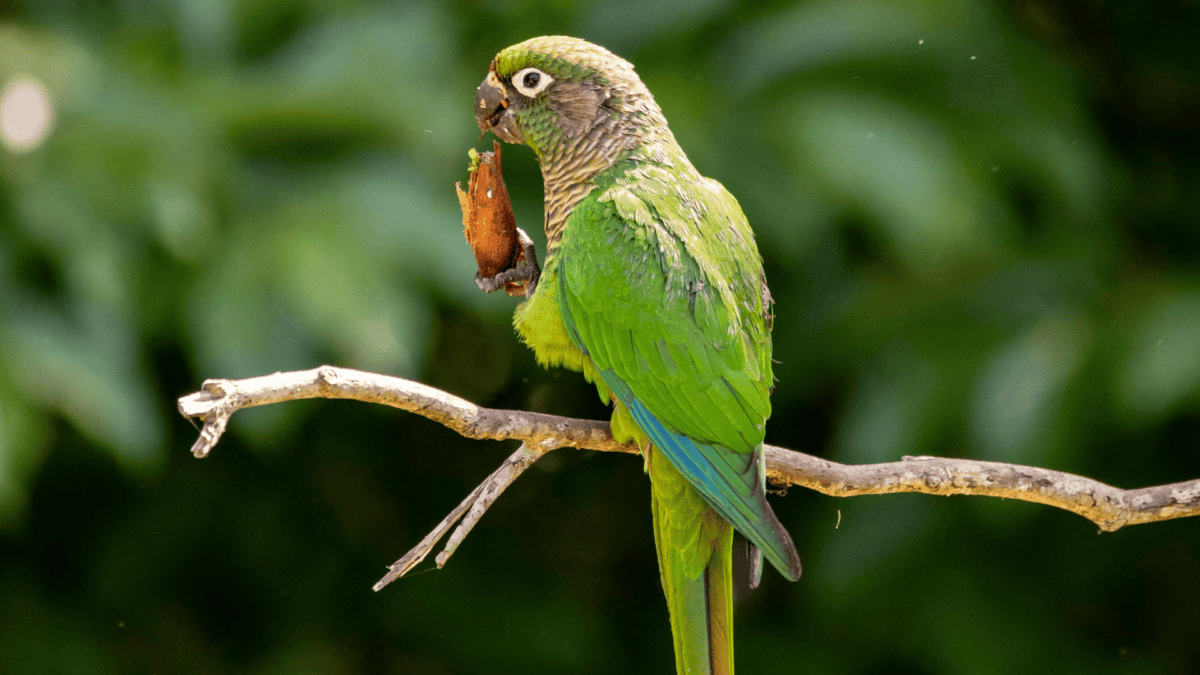Have you ever been startled by a bird that greets you with a cheerful “hello”? Parrots that talk are like feathery comedians, surprising us with their wit, charm, and sometimes even sass. These clever birds have fascinated humans for centuries, not just for their dazzling colors but for their remarkable ability to mimic our own voices. Whether you’re a lifelong animal lover or just curious about these feathered chatterboxes, you’re about to discover some truly astonishing insights. Get ready to fall in love, laugh out loud, and maybe even wish you had a parrot of your own!
12 Parrots Can Learn Hundreds of Words

It may sound unbelievable, but some parrots aren’t just limited to a handful of words—they can memorize and use hundreds! The African Grey Parrot is legendary for this, with some individuals reportedly knowing up to 1,000 different words. Imagine having a conversation with a bird that can answer back in full sentences! What’s even more amazing is that these birds don’t just parrot back words randomly; they often use them in context, showing a surprising understanding of what they’re saying. It’s no wonder people sometimes describe living with a talking parrot as having a toddler in the house. They pick up vocabulary from their environment, so you might find your parrot repeating phrases from your favorite TV show or even your phone calls. This incredible memory makes parrots some of the most intelligent birds on the planet.
11 Some Parrots Understand Meaning

Many people think parrots only mimic sounds, but research has shown that some species can grasp basic meanings. The famous African Grey, Alex, stunned scientists by not only saying words but also using them correctly. For example, Alex could identify colors, count objects, and even express desires like wanting a treat or to go somewhere. This level of understanding is almost unheard of in the animal kingdom and shows that parrots are much more than just feathered recorders. Their ability to connect words to real-life objects or feelings makes interacting with them both hilarious and deeply touching. Anyone who’s had a parrot call them by name or ask for a snack knows just how sharp these birds can be.
10 Mimicry Helps Parrots Survive

While it might seem like parrots talk just to entertain us, mimicry actually serves an important role in the wild. In their natural habitats, parrots use their remarkable ability to mimic sounds to blend in with other birds and animals, confusing predators and even rival flocks. Some scientists believe this skill helps parrots bond with their group, as learning and sharing sounds creates a sense of belonging. In captivity, parrots mimic household noises—doorbells, microwaves, or even laughter—because they see themselves as part of the family flock. This isn’t just funny; it’s how parrots build social connections, whether with birds or humans.
9 Not All Parrots Are Great Talkers

It’s tempting to think every parrot can recite poetry or sing your favorite tune, but the reality is a little different. Only certain species are famous for their talking talents, like African Greys, Amazons, and Budgerigars (budgies). Even within those species, not every bird will become a chatterbox. It depends on their personality, environment, and how much they interact with humans. Some parrots are shy and prefer to whistle or mimic simple sounds rather than speak words. Others might surprise their owners by starting to talk after years of silence. Just like people, every parrot has its own unique voice and style.
8 Parrots Can Copy More Than Just Words

If you’ve ever heard a parrot perfectly imitate a ringing phone or the sound of a barking dog, you know these birds are true audio artists. Parrots don’t just mimic human speech; they can reproduce all sorts of noises from their environment. This includes household sounds, music, and even other animals’ calls. Some birds have been known to mimic alarm clocks so well that owners have jumped out of bed in confusion! This talent for sound effects isn’t just entertaining—it’s a testament to how closely parrots observe and interact with their world.
7 Talking Ability Depends on Social Interaction

Parrots are highly social creatures, and their talking skills often reflect their bonds with their human families. Birds that are handled frequently, spoken to kindly, and included in daily life are far more likely to develop impressive vocabularies. When owners speak to their parrots regularly and with enthusiasm, the birds respond by trying to “join” the conversation. Lonely or neglected parrots, on the other hand, may become quiet or only make simple noises. This shows just how important love, attention, and socialization are for these clever birds.
6 Some Parrots Make Up Their Own Words

Sometimes, parrots get creative and invent their own words or phrases. This usually happens when a bird tries to mix sounds it hears or puts a twist on familiar words. Owners have reported their parrots coming up with funny nicknames, silly phrases, or even unique “words” that no one else in the house uses. This playful inventiveness is a clear sign of intelligence and adds a layer of comedy to life with a parrot. It’s like living with a comedian who writes their own jokes!
5 Parrots Can Have Distinct Accents

Just as people from different regions or backgrounds have unique accents, parrots often develop their own special way of speaking. If a parrot grows up in a home where someone has a strong accent, the bird may copy that accent perfectly. Some parrots even mix multiple accents if they hear different people talking around them. This quirky trait can make a talking parrot even more endearing, as they sometimes sound like a beloved grandparent or a favorite TV character. It’s proof that parrots are always listening and learning.
4 Budgerigars Hold the World Record for Words

While African Greys are often considered the best talkers, the record for the largest vocabulary actually belongs to a budgerigar named Puck. This tiny bird astonished everyone by learning over 1,700 words! Budgies may be small, but they’re mighty when it comes to mimicking speech. Their high-pitched voices might sound a bit different from larger parrots, but their quick minds help them pick up new words at lightning speed. It’s a reminder that even the smallest birds can have the biggest personalities.
3 Parrots Sometimes Use Words to Get What They Want

Anyone who lives with a talking parrot knows the birds are expert negotiators. Parrots quickly learn which words or phrases will get them a treat, a head scratch, or even a laugh from their humans. Some clever birds have been known to call out, “Step up!” when they want to be picked up, or say, “Want a cracker!” when they’re hungry. This ability to use language for persuasion is both hilarious and heartwarming. It’s a sign that parrots aren’t just repeating sounds—they’re communicating with intention.
2 Talking Parrots Can Form Emotional Bonds

The close relationship between parrots and their owners goes far beyond simple mimicry. Many talking parrots form deep emotional bonds with their human companions, often choosing a favorite person to interact with. These birds will greet their favorite humans with cheerful hellos or even call them by pet names. When their chosen person leaves the room, a parrot might call out in search or repeat comforting phrases. This emotional intelligence is part of what makes parrots such special and beloved pets.
1 Parrots Can Surprise You at Any Moment

Perhaps the most delightful thing about talking parrots is their unpredictability. You never know when they’ll come out with a new phrase, make a hilarious joke, or perfectly mimic a sound you’ve never even noticed before. Their ability to surprise and delight keeps life with a parrot endlessly entertaining. Sometimes, they even seem to know just when you need a laugh or a bit of comfort. Living with a talking parrot is like having a tiny stand-up comedian and loyal friend rolled into one colorful package.
Conclusion

Parrots that talk are nothing short of astonishing, blending intelligence, emotion, and humor in a way few other animals can. Their ability to speak, mimic, and interact with humans brings endless joy and wonder to those lucky enough to share their lives. Did you expect parrots to be such incredible companions?
- 15 Things You Did Not Know About Owl Eyes - August 7, 2025
- 15 Times Rescue Animals Proved They Are the Best Companions - August 7, 2025
- 14 Signs Animals Experience Joy - August 7, 2025

